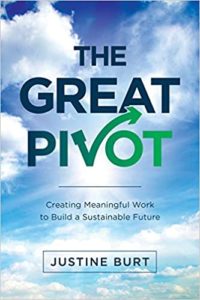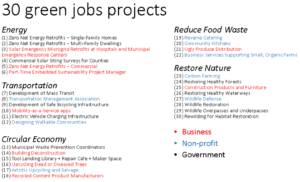
By Dr. Elvin Yüzügüllü
Now more than ever, we need justice…we need to protect our planet…and we need jobs. The COVID-19 pandemic has disrupted our basic needs and way of living–where we work, where we learn, public transit, our food system–while also leaving tens of millions of people without a job.
What’s the best way to tackle ever-expanding challenges? Expand our perspective too–view this crisis as an opportunity to reimagine, redesign, and deploy new types of jobs that can build the sustainable future we need.
On August 27, 2020, Leaders in Energy hosted its 7th Annual Green Jobs Forum, bringing together a diverse group–thought leaders, recruiters, entrepreneurs, job seekers, students, etc.–in engaging discussions.
Two keynote speakers–Martin Ogle, founder of Entrepreneurial Earth LLC, and Justine Burt, CEO of Appraccel and the author of The Great Pivot: Creating Meaningful Work to Build a Sustainable Future–provided valuable insights on how we could expand our perspectives and transform challenges into opportunities for a more livable world and justice for all. Janine Finnell, Executive Director, Leaders in Energy, served as the panel moderator.
Our goal is to create and live in a sustainable world, and we have growing concerns about the unsustainable path we are on. However, mere concern is not enough; we need thorough environmental knowledge too. Conventional wisdom has been to focus on somewhat narrowly-defined environmental or green careers. Herein lies the problem. These careers make up a very small percentage of the economy. And our problems are too multi-faceted to be tackled with a narrow point of view. This approach is a limiting factor in achieving our sustainability goals. Why are we limiting ourselves?
What is needed is an all-careers perspective to education to include environmental literacy in all disciplines. Imagine if we not only engage engineers and environmental scientists, but also finance experts, artists, musicians, architects, farmers, and many more diverse capabilities, inspiring young people to intentionally create a green economy, rather than leaving it to chance. Everyone can contribute, no matter their aptitudes, skills, or career directions.
One example of this overarching approach can be seen in the efforts of the Rich Earth Institute in Vermont, where urine is harvested to produce fertilizer. Waste from one process serves as input in another, aligning with the circular economy principles embedded in sustainability. Rich Earth is looking at things through an all-encompassing lens, considering not only the technology, but also engaging in outreach, education, engineering scale-up, field testing, research, grassroots work, and legislation. Another example is the Slow Money Institute, an organization that is guided by a mission statement of “…catalyzing the flow of capital to local food systems, connecting investors to the places where they live, and promoting new principles of fiduciary responsibility that bring money back down to Earth.” Thus, every career to make this one movement possible must be dependent on people better understanding fundamental environmental principles, processes, and having concern.
In bringing the making-all-careers-green vision forward, while there is not yet a comprehensive national effort in the United States, some states have been moving in this direction. The California Department of Education’s Blueprint for Environmental Literacy seeks to “…educate every California student in, about, and for the environment…” and to “…give all K-12 teachers the opportunity to use the environment as context for teaching their core subjects.” It has many powerful statements about the need for environmental literacy as a basis for career readiness. Internationally, Scandinavian countries are leading the way with more formal efforts. The Constitution of Finland, for example, includes declarations of responsibility for nature, biodiversity, environment, and cultural heritage, stating that education and training are necessary for people of all ages learn to address these responsibilities.

So, how do we create all these jobs?
In her book, The Great Pivot: Creating Meaningful Work to Build a Sustainable Future, Justine outlines 30 project categories that can provide millions of green jobs in five key areas—decarbonizing the energy system, decarbonizing transportation, implementing a circular economy, minimizing food waste, and restoring nature.
The job market had already been impacted by outsourcing, automation, and the gig economy (where people piece together several hours a week here and several hours a week there with no benefits). And then we faced a global pandemic. Between March and August of 2020, about 57 million people filed for unemployment, and 42% of jobs lost due to COVID-19 are not expected to come back, according to a study conducted by three University of Chicago economists. For a lasting green economic recovery that lifts everyone up, the key is to put justice and equity at the core, and then build green jobs around them.
With this type of focus, Justine makes the case in her article (co-authored with Mary Chambers) that the United States has the potential to create more than 14 million new deep green jobs. For example, switching to 100% renewable energy/energy storage/electrified transportation would create 5.2 million jobs. Bringing back the Civilian Conservation Corps (to plant trees, create trails, build roads, etc.) could accommodate our new socially-distanced normal and create 3.4 million jobs. Implementing high-speed rail would result in 2.6 million jobs. Transitioning to all organic agriculture would require more labor, adding 1.1 million jobs. Recycling and composting 75% of our waste would require 1 million jobs, and retrofitting buildings to be zero net energy would create 800,000 jobs.

On our pathway to a just, equitable, and sustainable future, creative and entrepreneurial approaches are also emerging. For example, lending libraries allow free borrowing of tools for landscaping, woodworking, the kitchen, etc. These spaces can even include a repair cafe and maker space. Old buildings are being deconstructed instead of being demolished (which releases hazardous emissions) and materials are salvaged for reuse. And at a time when more people are food insecure, folks are diverting surplus food to those in need.
Challenges will never end, and at times it may feel like we are in a pressure cooker. So, let’s expand our perspective, our creativity, our unity, to reimagine how much better things could be…
For further reference, view the panel presentations in the Event Archives.
Job Search Resources:
edscleanjobs@gmail.com (Email listserv; goes out once a week.)
Dr. Elvin Yüzügüllü is Leaders in Energy’s Zero Waste Coordinator. Elvin also serves as an Adjunct Professor teaching graduate-level classes at The George Washington University’s Engineering Management and Systems Engineering Department. She started her career by earning Bachelors and Masters degrees in Environmental Engineering, which she supplemented with a Doctor of Science degree from George Washington University in Environmental and Energy Management.



Leave a Reply